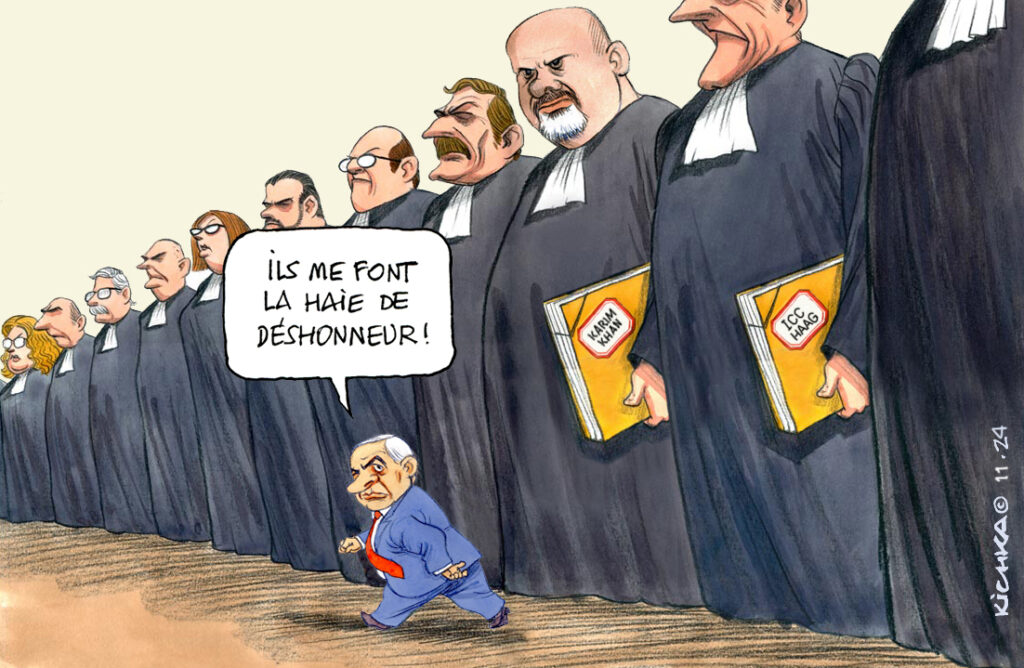Drawing by Kichka
“They make me the guard of dishonor
The decision made by the International Criminal Court (ICC) to issue an arrest warrant against Israeli Prime Minister Benjamin Netanyahu and former Defense Minister Yoav Gallant for war crimes and crimes against humanity has made headlines worldwide and sparked opposition from representatives of all Zionist parties in Israel.
Condemning these two leaders—potentially opening the door for future convictions of officers or soldiers—because of their conduct in a war triggered by the most devastating attack the country has faced since its establishment, has been perceived in Israel as a condemnation of its entire population. Seeing their leaders placed in the same dock as a number of dictators such as Jean-Pierre Bemba of the Congo (whose conviction was later overturned on appeal), Uganda’s Dominic Ongwen and Joseph Kony, Liberia’s Charles Taylor, and more recently, Vladimir Putin, is seen as an affront to Israeli democracy.
This ICC decision has even been condemned by Ms. Gali Baharav-Miara, the Attorney General, who is currently under attack by the most extreme members of the government and some media outlets due to her commitment to protecting Israeli democracy against the government’s efforts to consolidate control over the state’s institutions. She stated in a press release that the decision was “baseless, regrettable, and fundamentally wrong from a legal point of view.”
It is important to note that, unlike the International Court of Justice (ICJ), which is part of the UN and has jurisdiction over all its members, only states that have ratified the Rome Statute, which established the ICC, recognize its authority. This is not the case for Israel, nor for about sixty other UN member states.
Furthermore, the ICC can only exercise its jurisdiction when national courts lack the will or ability to deliver justice (the principle of complementarity), meaning it is meant to intervene only when internal legal systems are failing. This is not the case in Israel today.
This is the reason Ms. Baharav-Miara cites in condemning the ICC’s decision. She reminds that “The State of Israel is committed to the principles of the rule of law and has independent, impartial, and professional mechanisms—both military and civilian—to investigate allegations of violations of international law, whether regarding political matters or individual cases.”
Recalling these facts does not take a position on the ICC’s judgment regarding how Israel has conducted its war in Gaza for over a year under conditions that no army in the world has faced until now: in a very difficult operational environment, in densely populated urban areas where Hamas militants hide among civilians, with fighting occurring both above and below ground in tunnels.
Nonetheless, many questions remain regarding the conduct of this war, particularly concerning the scale of the bombings that have caused thousands of civilian casualties among the Palestinian population. There are also questions about the sufficiency of humanitarian aid to the population, which even the United States has criticized as inadequate, calling on Israel to allow 350 trucks per day into Gaza.
Only an independent state commission of inquiry could determine the veracity of these accusations. This is what nearly 80% of the Israeli population, as well as all military and security officials in the country, are demanding to analyze the failures that led to the October 7 attack.
This is also what the Attorney General has been calling for months, urging Netanyahu to stop blocking the launch of this commission to investigate the government’s management of the war. She states that this would be the only way to counter the legal actions being brought against Israel in international courts.
However, Netanyahu opposes this, as he refuses to define a clear exit strategy for the war, despite calls from the military. His primary concern remains holding his coalition together, while his extremist ministers are left with full freedom of action. Itamar Ben Gvir, the Minister of National Security, continues his project to seize control of the police, to the point that the Attorney General recently asked Netanyahu to consider dismissing him. Meanwhile, Bezalel Smotrich is preparing to recolonize part of the Gaza Strip and has announced that 2025 will be the year of annexation of the West Bank. Israel’s position on the international stage would be entirely different if it pursued legal action against settlers committing atrocities against Palestinians in the West Bank or civilians preventing humanitarian aid from reaching Gaza.
With this government, Israel is increasingly heading into a deadlock that threatens its survival as a Jewish and democratic state. We will analyze this situation at the conference we are organizing on December 7 at the 11th arrondissement town hall. The program will be available on our website. Although registration is closed, you can follow it live on our YouTube channel TvJCall throughout the day.
Among the speakers at the conference, we interviewed Or-ly Barlev, an independent journalist and activist who has been accompanying and documenting the protest movement against this government’s plans and for the release of hostages since its inception. She has just released a short video explaining the twelve reasons why Netanyahu wants to dismiss the Attorney General and the head of the Shin Bet (Shabak). You can watch it on the Collectif Sauver la Démocratie Israélienne channel.






